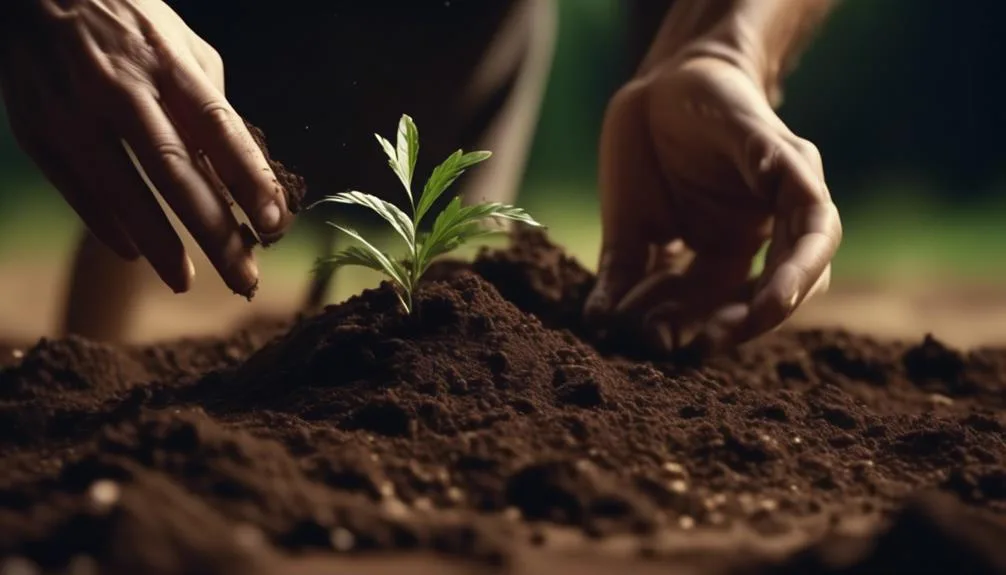Choosing the right soil for planting cedar trees is crucial for a successful garden. The soil serves as the foundation for the trees, giving them essential nutrients and support for growth. With various soil options available, it's important to understand the specific requirements for cedar trees.
In this discussion, we'll explore the key factors to consider when selecting the perfect soil for your cedar tree planting project.
Understanding Cedar Tree Soil Requirements
Understanding the soil requirements for cedar trees is essential for ensuring their successful growth and health in your landscape. Cedar trees thrive in well-drained soil with a composition that's slightly acidic to neutral. They prefer soil that's rich in organic matter and has good aeration.
When planting cedar trees, it's important to consider the nutrient requirements of the soil. Cedar trees benefit from soil that's rich in nitrogen, phosphorus, and potassium. A soil test can help determine if any of these nutrients are deficient, allowing you to amend the soil as needed.
Ensuring the right soil composition and nutrient balance will provide cedar trees with the foundation they need to establish healthy root systems and flourish in your landscape.
Assessing Soil Drainage and Texture
Assess the drainage and texture of your soil by observing how quickly water absorbs and whether it pools on the surface or drains away rapidly. Compacted soil can hinder water absorption and root growth, while well-aerated soil supports healthy root development.
To assess soil compaction, gently press a shovel into the ground. If it's difficult to penetrate, the soil may be compacted.
Additionally, soil fertility and nutrient levels are crucial for cedar tree growth. Conduct a soil test to determine the pH level and nutrient content. Cedar trees prefer slightly acidic soil with good fertility.
Sandy soils drain quickly but may require additional nutrients, while clay soils retain water and nutrients but can be poorly aerated.
Understanding your soil's drainage, texture, and fertility will help you make informed decisions for planting and maintaining healthy cedar trees.
Adjusting Soil Ph Levels for Cedars
If your soil test reveals an alkaline pH level, you may need to adjust it to meet the slightly acidic preference of cedar trees for optimal growth. To lower soil alkalinity, incorporate organic matter such as compost, peat moss, or pine needles. These amendments help to increase soil acidity, creating a more suitable environment for cedar trees.
Additionally, sulfur can be used to lower pH levels, but it should be applied cautiously as excessive use can harm the trees. It's crucial to retest the soil after making any adjustments to ensure the pH levels are within the desired range.
Adding Organic Matter to Improve Soil Quality
To improve the soil quality for planting cedar trees, consider incorporating organic matter such as compost, peat moss, or pine needles to create a more favorable environment for growth. Adding organic matter can significantly improve fertility, enhance nutrients, and enhance the soil structure. Here are five organic amendments to consider:
- Compost: Rich in nutrients, compost improves soil structure and promotes microbial activity.
- Peat Moss: Helps retain moisture and improve soil aeration, crucial for cedar tree root development.
- Pine Needles: A natural source of acidity, pine needles can help lower soil pH levels for cedars.
- Manure: Enhances soil fertility and provides essential nutrients for healthy cedar growth.
- Leaf Mold: Improves soil structure, retains moisture, and adds beneficial microorganisms for cedar trees.
Maintaining Proper Soil Moisture for Cedar Trees
After enhancing the soil with organic matter to improve its quality for planting cedar trees, the next crucial step is to ensure proper soil moisture for their optimal growth and health. Watering frequency plays a vital role in maintaining the right soil moisture for cedar trees.
It's essential to water the trees deeply but infrequently, allowing the soil to dry out slightly between watering to prevent waterlogging. Mulch usage can help retain soil moisture by reducing evaporation and maintaining a more consistent soil temperature.
Additionally, be mindful of soil compaction, as it can hinder water penetration and root growth. Check for nutrient availability in the soil, as it directly impacts the tree's ability to regulate water uptake.
Conclusion
Incorporating the right soil for cedar trees is essential for their long-term health and vibrancy. By addressing specific soil requirements, ensuring proper drainage and texture, adjusting pH levels, adding organic matter, and maintaining consistent moisture, you set the stage for thriving cedar trees in your outdoor space.
These considerations won't only promote the well-being of your trees but also contribute to the overall beauty and harmony of your garden or landscape.

My interest in trees started when I first saw the giant sequoias in Yosemite.
I was a teenager then, and I remember thinking, “I need to learn more about this.”
That moment stuck with me.
A few years later, I went on to study forestry at Michigan Tech.
Since graduating, I’ve worked in a mix of hands-on tree care and community education.
I’ve spent over ten years helping people understand how to plant, maintain, and protect the trees in their neighborhoods.
I don’t see trees as just part of the landscape.
They are living things that make a real difference in our daily lives.
